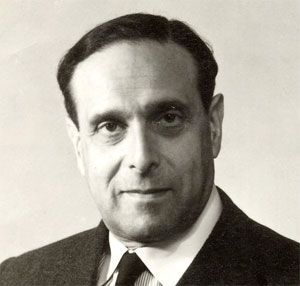Siegmund Warburg: People and Passion First – Profits to Follow
 These days, far too often loan applications for the funding of promising business ideas are rejected out of hand by bank computers that spits out a resounding ‘no’. Algorithms lacking intelligence, senses and – indeed – sense, now rule the financial world. Bankers, traders, analysts and other assorted money handlers just do as they are told by the computer. Human emotion, gut feeling and first impressions no longer play any role of significance. The banker has become an automaton, albeit an exceedingly well-paid one.
These days, far too often loan applications for the funding of promising business ideas are rejected out of hand by bank computers that spits out a resounding ‘no’. Algorithms lacking intelligence, senses and – indeed – sense, now rule the financial world. Bankers, traders, analysts and other assorted money handlers just do as they are told by the computer. Human emotion, gut feeling and first impressions no longer play any role of significance. The banker has become an automaton, albeit an exceedingly well-paid one.
Siegmund Warburg (1902–1982) would probably have despised his modern-day peers for their apparent lack of personality. And of courage: It is rather cowardly to blame a soulless computer for one’s own misses.
Mr Warburg was first and foremost a relationship banker. Numbers, statistics and ledgers did not really excite him as he cared for the people behind the digits; their passions, skills, integrity and overall personalities. He was also a man with the courage to accept first impressions as the basis for decisions. Would-be borrowers often need not explain in great detail their business plans. More often than not, Warburg would size up a client in the first few seconds of an initial meeting.
He would have been quite disgusted at the decline of relationship banking and the shift to the more heartless transactional banking which was such a significant factor in the lead-up to the recent global financial crisis.
Siegmund Warburg fled the Nazis in 1934 to found the firm S.G. Warburg alongside Henry Grunfield. As so often, Hitler’s loss was London’s gain. Warburg was a colourful man, full of flair and quite the opposite of the dreary, stuffy bankers then inhabiting the City. He was not liked or admired by his peers. Mr Warburg was very much the creative thinker and prided himself in finding a solution to most any problem, no matter how complex. However, his creativity did not extend to cheating and fooling the market (i.e. investors) as is so depressingly often the case with today’s bankers that try to experiment with out-of-the-box thought processes. It simply wouldn’t have occurred to Mr Warburg to chase profits through deceit.
A passionate advocate of European financial integration and managing director of his bank until the 1970s, Mr Warburg established singlehandedly the EuroBond market which was to massively enrich the firm. As author Niall Ferguson remarks, “Warburg led the western world back to the free market after the mid-century excesses of state control.”
Warburg’s lending decisions were based largely on his impressions of the man or woman seeking his support rather than on cold, bare figures on a sheet of paper. Did he see passion and drive in the owner and employees of a given company? If so, Mr Warburg would likely be suitably impressed and ask how he could help sustain and expand the business. “Tell me what you need” was his way of honouring any well-argued request for credit.
It was the people themselves who were important to Mr Warburg. His detractors sometimes point out that he often showed more concern for producing a profit for his clients than for his own bank. However that is a tribute to the man, rather than a weakness. Of course, Mr Warburg owed his success to enabling all-round profit-making.
As with most successful men, Mr Warburg could be quite brutal and had a ferocious board room presence. Famous for hostile take-overs in the mid-1950s, he threw out the directors of British Aluminium after wrestling control of the company from them. He has no time for losers, bloated egos or incompetence.
Sixty years ago Warburg wrote a memorandum setting out what he felt to be the most important qualities for a bank: Moral standing, a reputation for efficiency and high-quality brain work, connections, capital funds, personnel and organisation. He also advised bankers “not cry over spilled milk”; encouraged them to “cross bridges before you come to them”; and “never to indulge in wishful thinking”.
The world would be such a better place if only modern bankers could take a cue from Siegmund Warburg.
You may have an interest in also reading…
Big Banks: Cure or Curse for the Global Economy?
Friday 27 January 2012, CFI with report from the World Economic Forum in Davos, Switzerland with anchor Bloomberg Television Key Points
Michelle Bachelet and the Right of a Woman to Decide
When Chile’s government was ousted by Augusto Pinochet in 1973, Michelle Bachelet’s father (a supporter of the deposed Salvador Allende)
Deloitte & Touche: The Middle East’s Boost From Bank and Corporate Initiatives
The successful issuance of the Abu Dhabi Commercial Bank (ADCB) inaugural green bond in September 2022 is the latest in


















































































